Diane Keaton on her brother Randy
Diane Keaton on her one regret: her relationship with a troubled, oddball brother.
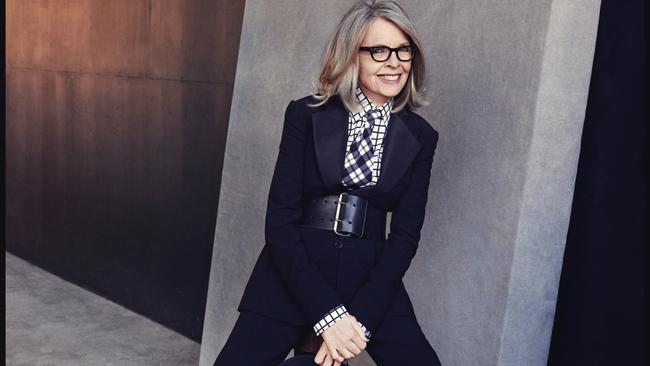
Every Sunday, Diane Keaton, 74, goes to visit her younger brother, Randy Hall, 71, in his “senior living” facility in the Los Angeles suburb of Culver City. Randy, who has dementia and Parkinson’s, has been living there for five years and Keaton is “pretty certain he doesn’t recognise me”.
“He’s not verbal anymore,” she says. “But a carer and I put him in a wheelchair and we wheel him around to the frozen yoghurt building around the corner – and it’s good times. You can tell that Randy loves being outside. He really is more present then. And he loves to eat. He’s fat, of course; he eats everything. So that’s what I do with Randy. It’s my weekly ritual, like going to church.”
It’s a ritual of love, but for Keaton it’s also a ritual of atonement, an attempt to assuage her deep-rooted guilt that for decades she avoided any involvement with her troubled brother, “who lived on the other side of normal”. “My life got busier while his got smaller and more difficult,” she says.
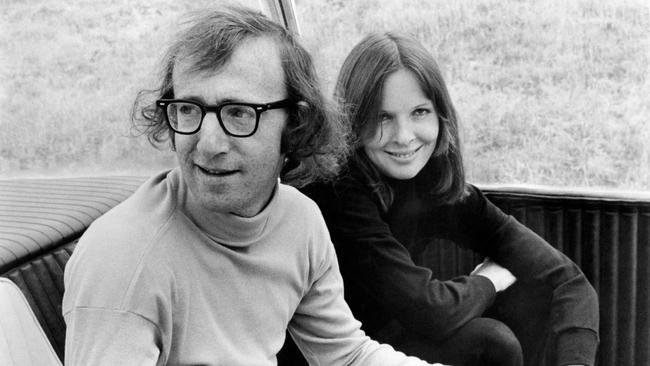
While Keaton spent the ’70s and ’80s based in New York, starring in films such as The Godfather and The Godfather Part II, Reds and Looking for Mr Goodbar, the only inkling the world might have had of Randy’s existence came from the scene in her boyfriend at the time Woody Allen’s 1977 film Annie Hall (about their relationship and in which Keaton starred as a barely disguised version of herself), when Annie takes her Jewish boyfriend Alvy (Allen) to visit the Waspy Hall family. There he’s taken aside by Annie’s brother, Duane, played by Christopher Walken. “Sometimes, when I’m driving on the road at night, I see two headlights coming toward me fast,” a deadpan Duane tells a nonplussed Alvy. “I have this sudden impulse to turn the wheel quickly, head into the oncoming car.” Shortly afterwards, we see Duane driving a terrified Alvy down a dark road to the airport. I’ve always remembered it as one of the funniest scenes in film history. But while Allen used his girlfriend’s brother for laughs, the truth about the real-life Duane wasn’t remotely amusing.
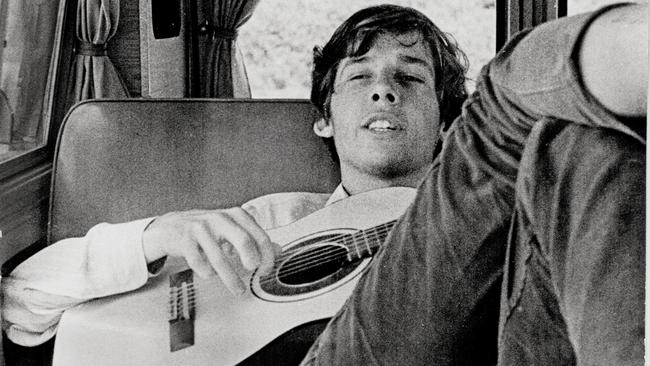
The role of Annie won Keaton an Oscar for best actress (the film also won best film, best screenplay and best director) and a place in America’s heart as its goofy eccentric. Yet meanwhile the true eccentric in her family was living in squalor, an unemployed virtual hermit, assailed by often violent fantasies, drinking to the point of liver failure, surrounded by collages of female body parts cut from magazines.
“I wish that I had been more available to Randy in a deeper way,” Keaton tells me. “But I was just an ambitious little thing. That was the story of my life. I was always running this project or that one. If I set up a club, it was all, ‘I’m going to be president.’ That’s the kind of sister I was. I had a lot of dreams for myself and I got lucky that way. Randy never really joined the world. At all.”
Now Keaton has produced a memoir, Brother & Sister, that has leapt into the New York Times Top 10 bestseller list. Extraordinarily honest, not just about Randy but about Keaton’s parents’ failings, it will resonate with anyone who both loves and feels oppressed by an oddball or “difficult” relation. Most of all, it’s a howl of self-flagellation, an outpouring of regret at Keaton’s perceived selfishness and self-absorption. “I wanted to know where I failed as a sister. I was a jerk. I mean, I wasn’t mean, but I was just so busy with myself.”
Just like her Annie Hall persona, Keaton can be somewhat aggravatingly self-deprecating. In her book she plays down her fame, describing herself as an “ambitious eccentric”. Yet you can see why she’s intent on playing the modesty card, consumed as she is by self-reproach as to how and why she bagged the majority of the family luck quotient.
“I think about that a lot. ‘What was it like to have a sister who did well in the profession they chose and received attention?’ Most people don’t see it so much as a problem, but you do feel guilty because unfortunately it’s not really fair or right. My [two younger] sisters are wonderful and very supportive, but I don’t think it’s been easy for them…” Keaton trails off, but the unspoken implication is, “So how much harder must it have been for Randy?” “Everybody is just as charming as me,” she continues. “It’s just early on I did everything I could to be in front of people.”
Now – even though Randy dodged any form of attention all his life – she wants him to have his turn in the spotlight. Admitting “I’ve never known how Randy experienced anything”, to aid her understanding of him Keaton plundered her late mother’s hundreds of letters, 32 diaries, 15 scrapbooks and 20 photo albums, as well as Randy’s two published poetry books, 500 collages, 54 notebooks and 75 diaries. “Some of his writings are kind of hard to make out, a bit obtuse, but some of them are really moving in a way that I just hadn’t imagined,” she says. Despite her extensive research, she concludes: “There are no concrete answers to why any of us are the way we are.” Nonetheless, she never stops trying to make sense of her and her brother’s different fates, starting with the fact that Randy had a difficult forceps birth.
In other respects the siblings had the same, apparently idyllic start in life. The four children of civil engineer Jack and housewife Dorothy Hall enjoyed textbook 1950s middle-class childhoods in the southern Californian town of Santa Ana. For the first three years of Randy’s life, until Diane was around five, the brother and sister shared a room, with confident Diane on the top of their second-hand bunk bed while Randy – “a nuisance, a scaredy-cat and a crybaby” who was afraid of the dark – slept below her. “He was so sensitive from the very beginning. Always too much sensitivity,” she says. “He was so easy to boss around. It doesn’t say much for me.” After the Halls moved to a larger house, the room-sharing stopped and the siblings’ connection grew weaker. Keaton thrived from kindergarten onwards, whereas Randy wrote that he was the “scared shitless kid who cried on the first day of school and ran out of the classroom three times before Mother was allowed to take me home”.
If there’s a key to why the siblings turned out so differently, it almost certainly lies in their relationships with their father. Jack Hall was ambitious and impatient, exasperated by his son’s lack of work ethic and his reluctance to throw himself into macho pursuits such as Boy Scouts. “I don’t have a pleasant memory of Dad,” Randy writes. “I was afraid of him the whole time. Remember when he spanked us and we had to pull down our pants before he whacked our bottoms… He was sadistic.”
Keaton won’t be drawn into saying anything harsh about her father, who was also tormented with worries about Randy’s wellbeing throughout his life. But she acknowledges that life was easier for her as a girl. “You know how much his only son must have meant to Dad. But Randy could never really live up to those expectations. It wasn’t easy for Randy and Jack Hall. I got the lucky deal and I utilised that good fortune. I didn’t have too much attention from my dad. I was left to my own devices. I got away with a lot.” As she writes, “My dream had nothing to do with Dad’s world of precision and expertise. I wanted to be a movie star; I wanted people – lots of people I didn’t know – to love me.”
The four siblings were showered with love by their mother. Keaton moved to New York at 18 to study acting, leaving Randy as the obsessive focus of Dorothy Hall’s adoration. While other family members were exasperated by his fecklessness, urging a tough love approach, she was determined to shield him from the world. “She truly believed he was a genius. That word ‘genius’ for her was an irrefutable shield against the ordinary expectations of people like Dad. “My mother’s relationship with Randy was really something rare. She was dearly in love with him; he was her treasure. She was a huge fan of everything he possibly did and could do,” Keaton says.
This blinkeredness led to many fallouts between the Halls. “Randy was the most difficult aspect of their marriage. My father didn’t really want to seek out medical help or psychiatric help for him. Of course, back then that was a ridiculous idea. But even as time went on it was hard. My father paid for everything for Randy – you can imagine what that must have been like for him. But Mom was just dedicated to Randy, even though it was very difficult for her.”
In fact, it sounds as if Dorothy’s all-consuming devotion affected all her children’s outcomes, romantically at least, with Keaton admitting that both she and Randy have spent a lifetime “arming ourselves against the vicissitudes of intimacy”.
“There’s a family trait of not really being able to embrace the outer world. Only one of us four children is married and I think that’s because we were loners who really were bound together by my mother, and that made us all a little removed from others,” Keaton says. “All the family were very charming, very likeable, but delicate too – we were a little group doing things together, not anti-social but not social-friendly. It was kind of odd.”
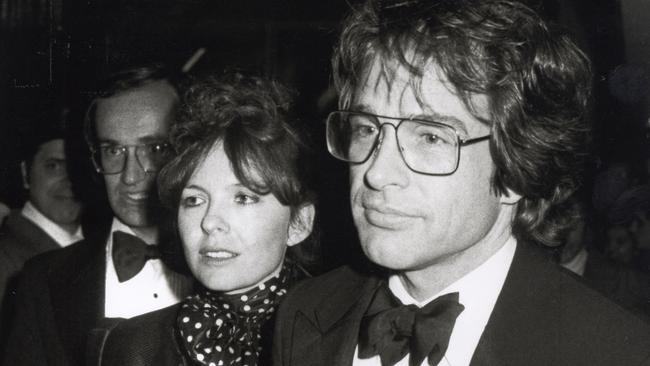
She may never have married, but Keaton (who adopted a daughter, Dexter, now 23, when she was 50, and a son, Duke, five years later) was at times as famous for her boyfriends as for her acting, enjoying relationships with Al Pacino, Warren Beatty and – most notoriously – Woody Allen, her on-off lover for decades, whom Keaton refused to denounce regarding his alleged molestation of his adopted daughter, Dylan. In return, Allen has credited Keaton as his muse during his early film career, with her starring in Manhattan, Sleeper, Love and Death and, most famously, Annie Hall – a riff on her real name (she was born Diane Hall, but took her mother’s maiden name, Keaton).
When Keaton took boyfriends such as Beatty home, was she nervous about how Randy might behave? “I wasn’t nervous, but I was aware that they were walking into something that was unusual. But with the few boyfriends who met him it was just, ‘Hello,’ and ‘Bye’. Randy was not obnoxious; he could manage [encounters] for a brief time, little leaps out before he’d retreat as much as he could.”
Yet day to day, Randy’s life was fast deteriorating. A youthful marriage that his family hoped would mark a turning point failed, with his wife complaining about his lethargic attitude and, more troublingly, his “waking fantasy of killing women”. “He couldn’t sustain marriage at all. It was too much for him,” Keaton says. She wonders if there was a name for Randy’s mental illness. “In later years, one doctor described Randy as a schizoid personality – ie, emotionally cold, detached, apathetic,’’ she writes. “I don’t remember Randy as apathetic or cold. I do remember it was hard to understand what was going on with him. If there was a problem, if he was under pressure, if a situation called for him to step up and be a man, Randy consistently refused to take arms. Yet his fantasies were the exact opposite of his actions. In his fantasies, he was a warrior, even a murderer. How do you explain that?”
Randy worked on and off for his father, but their everyday interactions proved too stressful and eventually he quit. Randy never looked for another job, instead supported by a monthly stipend, paid – at Dorothy’s insistence – by Jack; he spent his days consuming a six-pack of beer and ending it with tequila. Randy piled on weight and neglected his appearance so that by 35, “he proudly took on the role of a destitute man who appeared to have been raised by wolves”. “Were it not for Mom’s generous if ill-defined efforts, Randy would be on the street, abandoned, drunk, or even dead,” Keaton writes.
Living in New York, Keaton (who herself struggled with bulimia) chose not to inquire about her brother’s mental state. Yet occasionally Randy’s reality assailed her. In 1981, at the height of her fame, he sent her a letter about his fantasies (which, she stresses, he never acted out), writing, “I figured I would sneak into a room where a woman was sleeping and stab her to death.” Keaton told no one about the “disturbing and unexpected” correspondence, partly because she sensed that Randy, who hated all confrontation, only acted them out through his disturbing collages. “After all,” she writes. “I was someone who played out parts, living out fantasies in the safe realm of movies.”
In the book, it appears she didn’t engage with Randy at all throughout the ’80s, but now she says that’s not quite right. “He once visited me in New York and in London when I was making Reds, but that’s about it. He didn’t really want to extend himself beyond those few things. I’d go home for Christmas and he’d be there. He’d be charming but disappear. You just wonder what could you have done? Or how could you have helped?”
The last question has gnawed at her for decades, yet in reality Randy didn’t want to be helped. Eventually he started seeing a psychiatrist, which Keaton thinks was “very helpful”, but he constantly walked out of sessions. The family sent him to expensive rehab, but he quit almost immediately. Although he was prescribed medication for his various ailments, he frequently refused or forgot to take it.
In 1990, after Jack’s death, Keaton relocated to Los Angeles and began seeing Randy more regularly. After he was diagnosed with end-stage cirrhosis, she charmed surgeons into granting him a liver transplant (a hefty donation from the Hall family also helped him jump the queue). But within months of the operation he was ignoring his sisters’ pleas and drinking again. “I’m an alcoholic… I will never stop drinking, ever,” he affirmed.
“It’s not easy for us to know how to help a mysterious, unique, fearful person,” Keaton sighs. “He didn’t want to let people in. But you prevail in some way. You do the best you can. I think a lot of families out there are struggling with similar situations, not knowing exactly how to help but with this element of love that – in spite of everything – plays in your life.”
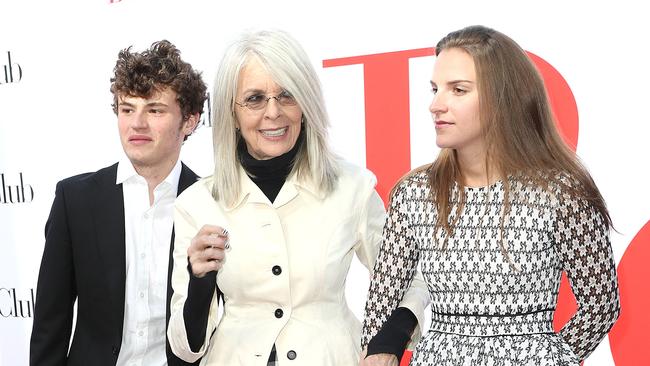
In 2011, Randy was diagnosed with dementia, so his sisters installed him in a “senior living” facility where, after decades of isolation, he thrived, becoming a heart-throb to the female residents. His new-found sociability made Randy more open to his family and Keaton, perhaps also softened with age, says for the first time she could remember she looked forward to seeing him. “Those were wonderful days. He was charming. And he was also [mentally] there. It was really special. We’d pick up a rock and we’d walk with it; we’d sit for an hour in front of the California bungalow made out of indigenous rocks and look at it because it was fascinating.” All the time, Keaton was chastising herself for how many of these moments she’d missed previously. “It was like, ‘Slow down and look!’ Life is amazing; enjoy what there is for us. Randy opened that up to me for the first time in years and I’m really grateful to him. I don’t know what to say except I’m sorry. I wish I could have given him more love and attention sooner.”
In the book, Keaton describes her bunk-sharing days with Randy as “my most intimate relationship with any male”. “That is definitely true,” she exclaims. “I have a son – but that’s very different. I’m kind of a strange character, I’ve been a single woman all my life. I guess I’m an old maid. But I had my brother and that was special, and it’s come to pass that he’s changed how I feel about what it is to really be there for a man.”
That “golden period” was brief. After four years, Randy’s condition deteriorated and he was moved to his current home. Does he know about the book? Keaton seems surprised at the question, but then excited. “No! I haven’t told him. I don’t know if he understands. But I will tell him now. There’s actually a book in the world about Randy and I’m going to bring one to him.”
©The Times

To join the conversation, please log in. Don't have an account? Register
Join the conversation, you are commenting as Logout